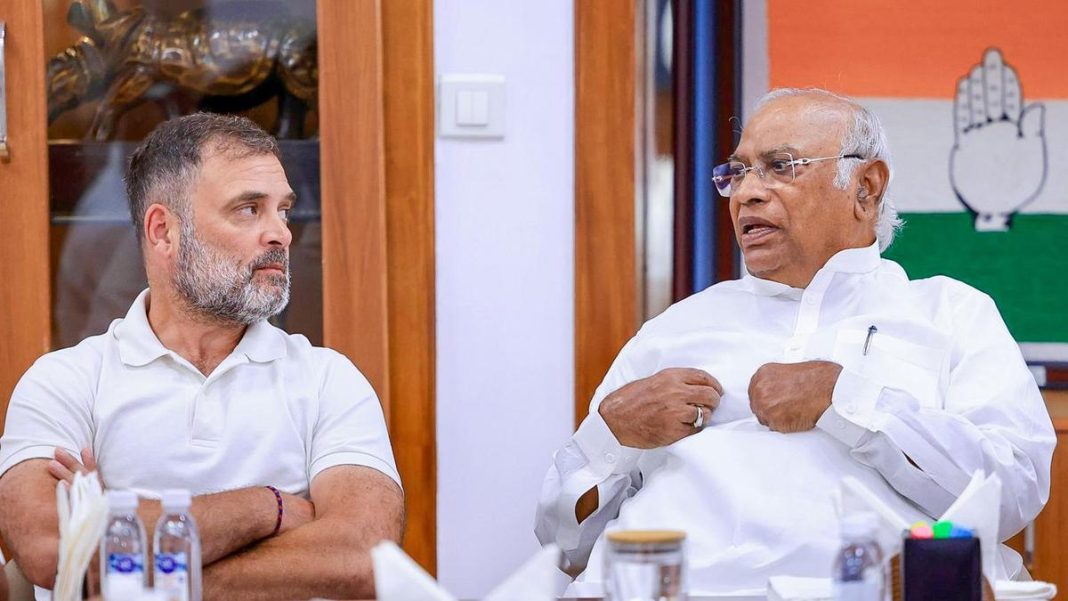In a significant move signalling introspection and strategic recalibration, Congress leader Rahul Gandhi recently held a crucial meeting with party president Mallikarjun Kharge. The primary agenda: a detailed review of the party’s disappointing performance in the recent Bihar assembly by-elections, a contest that saw the Congress fare below expectations despite being a constituent of the INDIA bloc. The high-level discussion comes amidst growing concerns within the party about its electoral footprint and is further complicated by the Congress’s strong assertion of ‘vote chori’ (vote theft) in several constituencies.
Rahul Gandhi, Kharge Deliberate on Bihar Setback
The closed-door meeting between Rahul Gandhi and Mallikarjun Kharge at the Congress headquarters in Delhi underscored the urgency with which the party is addressing its electoral challenges. While details of the specific deliberations remain under wraps, sources within the party indicate a thorough post-mortem of the Bihar by-poll results. The Congress, which contested a limited number of seats as part of the broader INDIA alliance, saw its candidates struggle to gain traction against the formidable National Democratic Alliance (NDA).
For the Congress, Bihar was a critical test case for alliance politics and ground-level mobilisation. Despite the collective effort with allies like the Rashtriya Janata Dal (RJD) and the Left parties, the results have prompted a serious re-evaluation of campaign strategies, candidate selection, and voter engagement. The party leadership is reportedly keen on understanding the nuances of the defeat, from local issues that swayed voters to the effectiveness of their messaging against the ruling coalition.
The ‘Vote Chori’ Allegation: Congress’s Defiance
Adding a contentious layer to the post-election analysis is the Congress party’s steadfast assertion of ‘vote chori’. Several party leaders, particularly from the Bihar unit, have openly alleged widespread irregularities and manipulation during the counting process in various constituencies. This charge, while not entirely new in Indian political discourse post-elections, places the integrity of the electoral process under scrutiny and serves as a rallying cry for the Congress cadre.
The allegations range from discrepancies in vote counts, sudden changes in leads during tabulation, to alleged pressure tactics influencing returning officers. Congress leaders have indicated they are compiling evidence and plan to take the matter up with the Election Commission of India (ECI) and, if necessary, through legal channels. The party views these alleged irregularities not merely as technical glitches but as a deliberate attempt to subvert the democratic mandate.
A senior party functionary, speaking to TrendLyric.com, emphatically stated, “We have observed significant irregularities and discrepancies during the counting process in several constituencies. It is imperative that these concerns are thoroughly addressed to uphold the integrity of our democratic process. We will not be silenced and will fight for every single vote that was cast for us.” This sentiment reflects the party’s determined stance to challenge the outcome beyond mere acceptance of defeat.
Intra-Party Reflection and Future Strategy
Beyond the serious allegations, the meeting between Gandhi and Kharge also focused on internal party dynamics and future electoral strategies. The Bihar performance has reignited debates within the Congress about its organisational strength, leadership at the state level, and its ability to transfer votes effectively to alliance partners. The party’s national leadership is reportedly keen to implement reforms that can strengthen the grassroots machinery and prepare it for upcoming state elections and the crucial 2029 general elections.
The discussions are also expected to touch upon the broader implications for the INDIA bloc. A strong performance by any constituent party strengthens the alliance’s bargaining power and collective morale. Conversely, setbacks prompt questions about coordination and joint campaign efficacy. For Congress, improving its electoral showing in key states like Bihar is paramount to reasserting its position as a pivotal player within the opposition alliance.
The party’s two-pronged approach – internal introspection coupled with a vigorous challenge to the electoral outcome based on ‘vote chori’ claims – highlights a critical juncture for the Congress. As India’s political landscape continues to evolve, the ability of the grand old party to adapt, learn from its setbacks, and effectively articulate its concerns will be crucial in shaping its trajectory ahead.




